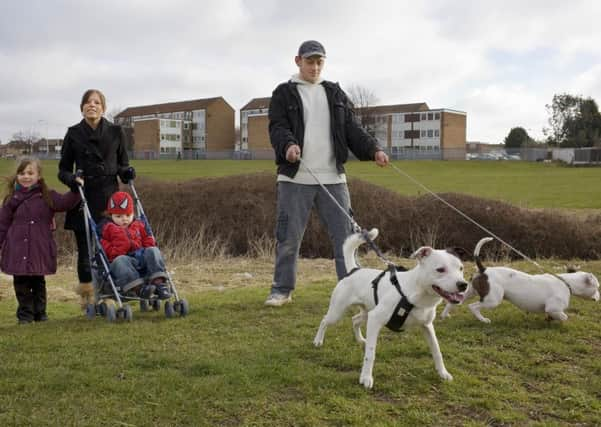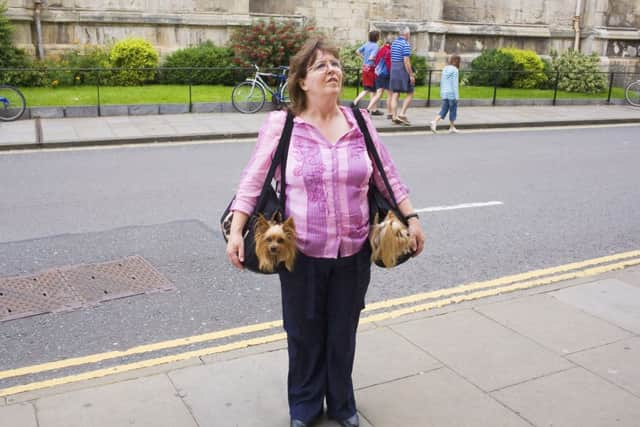Real life portrait


A woman carrying two Yorkshire terriers in shoulder bags stops to admire the architecture in York; one of the dogs looks indifferently toward the camera. Hull market trader Mick Beardshaw stands in front of the fruit stall he’s worked at for the last 30 years, a broad smile across his face. Elsewhere in the city, two childcare workers push a buggy of six children oblivious to the graffiti alongside them warning ‘Smile 2moro will be worse!!!!’
These are some of the images which award-winning photographer and Leeds gallery owner Peter Dench has taken so far in his attempt to show what it’s like to live in Britain today.
Advertisement
Hide AdAdvertisement
Hide AdChallenged to contribute a visual essay for new national research project, The Future of Britain, Dench has been travelling across the country for the last few months and is looking to recruit more subjects, particularly in the north.


“I’m not making the connections I’d hoped, it’s quite tricky just turning up in an area and trying to make sense of it without someone from Seacroft say, saying, ‘Well, come and see how I live, spend an afternoon, have a cup of tea’, or someone in Bingley or Shipley or Harrogate say, whatever situation they’re in I think there’d be something interesting to document.”
So far his subjects have ranged from school children sitting next to each other texting, London commuters looking harassed, a family on the school run, a sixth form prom and a striking image of a woman called Suzanne apparently unaware of the camera as she sits at her dining room table, watching an episode of Friends on TV while her fingers hover over the laptop keyboard in front of her. The caption on the Future of Britain website tells of Suzanne’s redundancy from a well-paid PA job in 2007 and her ongoing job search, “She is at risk of losing her home in Sevenoaks and struggles to raise her daughter, 16, and her 19 year-old-son”.
Dench says of their meeting, “She wanted her voice to be heard. She was doing all the right things but wasn’t having any luck, she was getting squeezed by the authorities to try and reduce her benefits and she just got to the point where she wanted an outlet for her circumstances to be heard.”
Advertisement
Hide AdAdvertisement
Hide AdCapturing such an intimate and honest portrait is not new for Dench. Last year his book England Uncensored was published, the result of 10 years documenting British people’s lives with the humour and empathy which has become his trademark, winning him a World Press Photo Award and commissions from the likes of Time Magazine, Tatler and The Guardian.
What’s the trick to making people feel comfortable being photographed?
“There’s no trick. I’m not branded, I’ve got no tattoos, no religious insignia, I don’t wear a football shirt, so I could be what people want me to be really,” Dench says. “I’m not imposing my personality on them from the start, I hope you’ll agree I’m quite comfortable to sit with and unassuming and that kind of helps. There’s no method to it, it’s just to listen, I suppose, and react to their circumstances, try to understand and be clear in what you’re trying to achieve.
“I’m not ashamed to be a photographer, I’m not ashamed of what I’m doing so if I’m open and honest about what I want to achieve and what they can get out of it then it’s helpful for both of us.”
Advertisement
Hide AdAdvertisement
Hide AdWhen we meet at the White Cloth Gallery, the Leeds art venue and bar he is co-director of, he mentions that he’s going to the Leeds v Bournemouth football match being played that evening. He doesn’t wear a football shirt but, since he’s from Bournemouth and Leeds United and his home team have history, it’s probably for the best.
Now London-based, the city might then seem a surprising choice for Dench to open the gallery in 2012.
“I’d meet lots of other photographers and I was always asking, ‘where’s that great exhibition’,” he explains. “And they’d always say, ‘oh, it’s on top of the wardrobe’ or ‘under the bed’ or ‘in storage’ so my drive was to try and find somewhere that would give their work an extra lease of life, an extra three months. Leeds is far enough away from London to have its own identity.”
He loves the city and doesn’t reckon there’s the north south divide that the media might purport. Mid-way through photographing for the Future of Britain project I wonder what he thinks the prevailing mood of Britain is?
Advertisement
Hide AdAdvertisement
Hide Ad“Three words, I think: collaborative times, diversifying times and quite exciting times, I don’t think there’s an optimism just yet but I think certainly there’s an understanding that we have to be a bit more creative and a bit more proactive in our choices. I mean, I’m from the credit card generation, when I was in my 20s I had access to £38,000 of credit which I devoured at great cost and regret since. That’s all gone and I think people are almost taking charge again of their own choices. That vulgarity of the 80s and early 90s has gone.”
Of course, photographing real life can have its drawbacks. “Photographing the English I’ve only ever been punched in the face once,” Dench laughs, “and guess where that was, it was in Leeds!”
Having photographed the Miss Leeds competition, he attended an after-party, and intervened when a man was giving unwanted attention to a woman. “We’re observers first and foremost, we’re not there to intervene. But occasionally you do have to put yourself in a situation if something’s happening that you don’t feel you could watch without consequences.”
For more information or to offer to be photographed, visit futureofbritain.com, contact Peter via Twitter @peterdench or email [email protected]